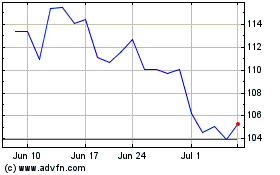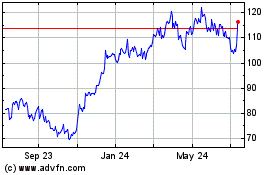By Chris Kirkham
In the home-building business, land purchases are every bit as
important as the concrete, wood and insulation.
Buy land at a low price in a good location and you can generate
significant profits from home sales on those lots. Buy the wrong
land at the wrong time and you can be saddled with expenses years
down the line.
As a battle between the founder of home builder PulteGroup Inc.
and its chief executive shifts to its annual shareholders' meeting
Wednesday, the land game has emerged as a major flashpoint in the
debate over the company's future.
"PulteGroup's land position is deep, but CEO [Richard] Dugas has
not been able to figure out how to utilize this asset," said
William J. "Bill" Pulte, the company's founder and largest
shareholder, in a recent letter that took aim at board members who
support Mr. Dugas, the current chief executive and chairman. "The
ability to deliver more homes on existing owned lots is untapped
potential with the right leader at PulteGroup."
PulteGroup management has dismissed that assessment, arguing the
company will significantly boost the number of home sales this
year, making its pipeline of land "comparable to the rest of the
industry."
Over the past month, Mr. Pulte has launched an offensive against
Mr. Dugas, a onetime protégé whom Mr. Pulte handpicked to become
chief executive in 2003. Amid pressure from Mr. Pulte, Mr. Dugas
last month announced he would be retiring next year. Mr. Dugas
declined to comment on Mr. Pulte's assertions.
But Mr. Pulte has continued to demand Mr. Dugas's immediate
resignation, arguing to board members and shareholders that
PulteGroup's stock performance has lagged behind rival home
builders throughout the housing recovery. He vowed to vote against
every board member at this week's shareholders' meeting if they
didn't replace Mr. Dugas and the lead director, James Postl.
Despite the rhetoric, analysts don't expect much to change after
Wednesday's annual meeting. The skirmish has been public for only a
month, leaving little time for Mr. Pulte to galvanize
investors.
Mr. Pulte is the largest shareholder, but with 8.9% of
outstanding shares he has far from a controlling interest.
Mr. Pulte has pointed to the company's stock price since the
beginning of 2014, which has fallen by 5% as competitors D.R.
Horton Inc. and Lennar Corp. have gained 43% and 17%,
respectively.
A key reason for that underperformance, Mr. Pulte said, is slow
growth in home closings. PulteGroup's closings have declined by
about 3% since 2013, while D.R. Horton has boosted closings by 52%
and Lennar by 33% over the same period, according to the most
recent annual data.
Mr. Pulte has argued the company isn't taking advantage of the
lots it already has on its books, and is continuing to spend money
acquiring new land at a time when lots are expensive. He said the
company's land is "sitting there like dead wood." Mr. Dugas
declined to comment.
In a statement, the company said it is focused on driving "more
profitable growth and higher returns rather than just delivering
growth for growth's sake." PulteGroup cited recording a 40%
compounded annual growth rate in pretax profit between 2011 and
2015 on only 3% compounded annual growth in home deliveries over
the same period.
The skirmish dates back to the last recession. In 2009
PulteGroup announced a merger with Dallas home builder Centex,
which specialized in entry-level homes at lower price points. For
marketing the deal to investors, one of the key selling points was
the enormous inventory of lots the combined company would be able
to harvest once housing demand picked up.
By May 2010, PulteGroup was projecting a return to profitability
for the year. Instead, by the end of 2010 the company had to record
write-downs on the Centex deal totaling more than $1.2 billion -- a
sum that nearly matched what PulteGroup had paid up front in stock.
The company declined to comment on the deal.
With a large supply of lots already on hand, the company
remained on the sidelines as the real-estate market bottomed in
2011. Other builders, particularly Lennar, bought attractive lots
at bargain prices between 2010 and 2013.
In 2012 and 2013, Lennar and D.R. Horton were spending more than
30% of revenue on land, according to data compiled by Barclays
analyst Stephen Kim, in a sign of investment in growth. PulteGroup,
by contrast, was spending about 20%.
In recent years, as land prices have risen, competitors have
decreased land spending, while PulteGroup has increased its
spending to 40% of revenue.
"They're continuing to spend on land at a very elevated rate,
even though they acknowledge they already have a lot of land," said
Mr. Kim.
Over the past five years, Mr. Dugas has outlined a strategy that
focuses less on the volume of home sales and more on profitability.
Analysts said the company might simply be playing the hand it has
been dealt.
"They were late to the game in terms of buying land, because of
the Centex deal they had to digest," said Susan Maklari, an analyst
with UBS. "But now's not the time to go out and start chasing
growth."
Write to Chris Kirkham at chris.kirkham@wsj.com
(END) Dow Jones Newswires
May 03, 2016 15:19 ET (19:19 GMT)
Copyright (c) 2016 Dow Jones & Company, Inc.
PulteGroup (NYSE:PHM)
Historical Stock Chart
From Mar 2024 to Apr 2024

PulteGroup (NYSE:PHM)
Historical Stock Chart
From Apr 2023 to Apr 2024
